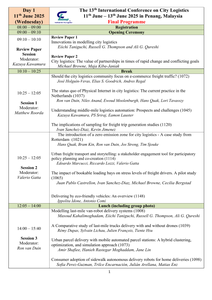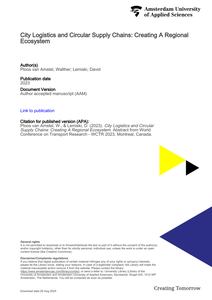De poster is gepresenteerd bij de NV wetenschapsdagen palliatieve zorg: Door de groeiende omvang en complexiteit van palliatieve zorg neemt ook de druk op ziekenhuiszorg toe. Op een Palliatieve Unit (PU) worden patiënten opgenomen voor pijnbestrijding, herstel van bijwerkingen of in afwachting van passende vervolgzorg. De vraag is of vrijwilligers een rol kunnen spelen in de zorg op een PU. Een kwalitatieve studie werd uitgevoerd met semigestructureerde interviews en vignetten (korte scenario’s). Deelnemers waren drie verpleegkundigen en drie zorgvrijwilligers uit drie hospices in de regio, een teamleider en twee oncologieverpleegkundigen van de PU, en twee VS van het Palliatief Team. In een Community of Practice (CoP) met vertegenwoordigers van alle stakeholders zijn de resultaten besproken.
DOCUMENT
Environmental concerns and urbanization pressures are driving demand for more efficient reverse logistics in city environments, where space constraints and dense populations create unique challenges. Polyurethanes (PU), used widely in insulation, electronics, and automotive industries, are integral to circular supply chain discussions due to their low recycling rates. This study emphasizes the challenges of urban reverse logistics for the disposal and collection of refrigerators in countries with different waste management systems. In the paper qualitative and quantitative methods have been applied. Based on the research carried out, it was shown how complex the reverse logistics process is in the city concerning waste such as fridges. It is influenced by, among other things, regulations at EU and national level, cooperation between stakeholders, consumer awareness and education, and real-time access to information on waste.
DOCUMENT

Introduction: There are two surgical approaches to reconstruct a pressure ulcer (PU): one-stage reconstruction or two-stage reconstruction. One stage reconstruction consists of surgical debridement and flap reconstruction during one operation. Two-stage surgery consist of a surgical debridement and a final reconstruction in two different sessions, with approximately six weeks between both sessions. Objective: The aim of this study was to compare the results of single stage surgery and two-stage surgery on the PU recurrence rate and other important post operative complications. Method: A retrospective, comparative study in Spinal Cord Injured (SCI) individuals with a single- or two stage surgical reconstruction between 2005 and 2016 was designed. A total of 81 records were included for analysis. Results: The primary outcome, the difference in occurrence of a recurrent PU in the reconstructed area (33.3% versus 31.6%), is not statistically significant between one-and two-stages reconstruction. Also, the mean duration to develop a recurrent PU between both surgical reconstructions is not statistically significant. Other surgical complications in the reconstructed area like wound hematoma, hemorrhage, seroma or (partial) flap failure did not differ significantly between both groups, apart and in total. We calculated the additional costs in case of a two-stage approach compared with a single-stage reconstruction at EUR 16,362. Conclusions: There are no statistical significant differences in PU recurrence rate or other post operative complications between SCI patients who have undergone one- or two stage PU reconstructive surgery. The most obvious choice for a one-stage approach in case of PU reconstructive surgery has great positive implications for the patient, family, health care providers and the health care system.
LINK
Implementing circular urban supply chains is a major economic transformation that can only work if significant coordination problems between the actors involved are solved. This requires, on the one hand, the implementation of efficient urban collection technologies, where process industries collaborate hand-in-hand with manufacturers and urban waste treatment specialists and are supported by digital solutions. On the other hand, it also requires implementing regional ecosystems connected by innovative CO2-neutral circular city logistics systems smoothly and sustainably managing the regional flow of resources and data, often at large-scale and with interfaces between industrial processes and private and public actors. Develop blueprint for circular urban region This research project aims to develop a blueprint for circular urban regions, including the demonstration of a territorial cross-sectorial, large-scale and sustainable systemic solution for the circularity of high-performance plastics from diverse applications of rigid polyurethane (PU) foams used as insulation material in refrigerators and construction elements. The research project develops a blueprint for regional participative governance using an approach involving multiple actors from the public-, private-, academic-, and financial sectors and civil society (by working in living labs).The focus of the presentation (and paper) is on the control tower elements of the circular urban supply chain and the elements to make the collaboration work.In terms of urban logistics and collection services is to make these materials accessible for downstream sorting and recycling processes for the first time in a sustainable and economically viable way. The project will develop a new way of processing defined waste streams like appliances (refrigerators), to separate chemically recyclable PU from a mixed plastics waste stream.
DOCUMENT

Of all patients in a hospital environment, trauma patients may be particularly at risk for developing (device-related) pressure ulcers (PUs), because of their traumatic injuries, immobility, and exposure to immobilizing and medical devices. Studies on device-related PUs are scarce. With this study, the incidence and characteristics of PUs and the proportion of PUs that are related to devices in adult trauma patients with suspected spinal injury were described. From January–December 2013, 254 trauma patients were visited every 2 days for skin assessment. The overall incidence of PUs was 28⋅3% (n = 72/254 patients). The incidence of device-related PUs was 20⋅1% (n = 51), and 13% (n = 33) developed solely device-related PUs. We observed 145 PUs in total of which 60⋅7% were related to devices (88/145). Device-related PUs were detected 16 different locations on the front and back of the body. These results show that the incidence of PUs and the proportion of device-related PUs is very high in trauma patients
DOCUMENT

Op woensdagmiddag 4 juni heeft het consortium plaatsgevonden in het Spaarne Gasthuis. Er waren ca 18 deelnemers uit verschillende hoeken: onderzoek, vrijwilligers coördinatoren (hospice, adamas, spaarne), vrijwilligers, verpleegkundigen, verpleegkundig specialisten en ervaringsdeskundigen/leden van de cliëntenraad. De presentatie is bijgevoegd
DOCUMENT

Recently, we have introduced two graph-decomposition theorems based on a new graph product, motivated by applications in the context of synchronising periodic real-time processes. This vertex-removing synchronised product (VRSP) is based on modifications of the well-known Cartesian product and is closely related to the synchronised product due to Wöhrle and Thomas. Here, we recall the definition of the VRSP and the two graph-decomposition theorems, we relax the requirements of these two graph-decomposition theorems and prove these two (relaxed) graph-decomposition theorems.
DOCUMENT

De aanwezigheid van de omgangscomponent en de machtscomponent wordt m.b.v. principale componenten analyse duidelijk aangetoond. De gemiddelde gedragsbeoordelingen van de respondent t.o.v. zowel succesleerling als puzzelleerling zijn op de omgangswerkwoorden aanzienlijk hoger dan op de machtswerkwoorden. De respondenten beschrijven hun gedrag dus meer in termen van omgangswerkwoorden dan in termen van machtswerkwoorden. Binnen de omgangswerkwoorden zijn de scores voor de succesleerling hoger dan die voor de puzzelleerling, terwijl binnen de machtswerkwoorden de scores van de puzzelleerling hoger zijn. De succesleerlingen gedragen zich volgens de respondenten meer in termen van omgangswerkwoorden en de puzzelleerlingen meer in termen van machtswerkwoorden. Er is sprake van een sekse-effect van de respondent: - de manlijke respondenten beoordelen hun eigen gedrag t.o.v. zowel succesleerlingen als puzzel leerlingen meer in termen van machtswerkwoorden dan vrouwelijke respondenten dat doen. - de succesleerling en de puzzelleerling scoren volgens de manlijke respondenten op de machtswerkwoorden hoger dan volgens de vrouwelijke respondenten. Voorts was er een effect van het wel of niet voor de klas staan: de docenten scoorden hun gedrag t.o.v. zowel succesleerling als puzzelleerling op de machtswerkwoorden hoger dan de nietdocenten.
DOCUMENT

This paper presents challenges in city logistics for circular supply chains of e-e-waste. Efficient e-waste management is one of the strategies to save materials, critical minerals, and precious metals. E-waste collection and recycling have gained attention recently due to lower collection and recycling rates. However, implementing circular urban supply chains is a significant economic transformation that can only work if coordination decisions are solved between the actors involved. On the one hand, this requires the implementation of efficient urban collection technologies, where waste collection companies collaborate with manufacturers, urban waste treatment specialists, and city logistics service providers supported by digital solutions for visibility and planning. On the other hand, it also requires implementing urban and regional ecosystems connected by innovative CO2-neutral circular city logistics systems. These systems must smoothly and sustainably manage the urban and regional flow of resources and data, often at a large scale and with interfaces between industrial processes, private, and public actors. This paper presents future research questions from a city logistics perspective based on a European project aimed at developing a blueprint for systemic solutions for the circularity of plastics from applications of rigid PU foams used as insulation material in refrigerators.
MULTIFILE

Meta-analyse van peer reviewed publicaties op het gebied van informatiewetenschappen die in 2010 door onderzoekers uit Nederland zijn gepubliceerd.
DOCUMENT
